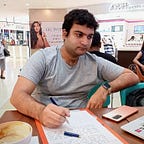Omicron Cases Rise as Indian COVID Warriors Try to Survive
As Omicron cases rise in India, the country may be moving into another premature lockdown. 70,000 resident doctors continue to be on strike, and the NEET-PG Counseling is on hold. Police brutality remains unchanged.
For readers outside of India, this week is in the news. PM Modi’s visit to Ferozepur got canceled. It was due to a security breach. Also, a mini-lockdown happened, and Omicron cases have visibly spiked. But, in the middle of all this chaos, resident doctors have gotten stuck fighting COVID-19 on the frontlines. Resident doctors (those unaware) work at public hospitals in India to undergo specialist training. Our COVID warriors are protesting, but nobody is listening.
The reason behind the protest
Medical students in their 2nd and final year of their PG course are against the EWS (economically weaker section) quota for medical college admissions. In India, we have a nationwide admission exam for post-graduate courses called NEET-PG (National Eligibility and Entrance Test.)
These resident doctors have been waiting for the new post-graduate students batch to gain admission. For which these students need to undergo NEET-PG Counselling. Now, the exam results have gotten declared. The counseling should have started. I intend to highlight that these medical students haven’t seen home in six months. Here’s the story.
Background
The EWS quota is getting challenged in the Supreme Court. The Center introduced an EWS reservation of 10% in 2019 through a constitutional amendment. It also gave the Central government (we follow a federal structure) the power to decide the income and asset indicators to define the criteria.
The Supreme Court chose not to challenge the policy, instead, to question if it has fulfilled the constitutional prerequisites that validate it — making it a lawful reservation category.
The income criterion was arbitrary as the family income criteria for the EWS and OBC quota got capped at Rs. 8 LPA. That is also the limit for the OBC category; after this cap, one comes into the “creamy layer.” It is because they have economically progressed to compensate for the social handicap.
EWS Quota Controversy
The main controversy is that the EWS and OBC quota share the same family income limit. Despite the latter having a significant social handicap, the EWS quota gets defended. So, the EWS quota eligibility criteria stand as such: (1) a family income lower than Rs. 8 LPA (2) possession of agricultural land or residential plot of a specified threshold.
The first criterion has been a source of significant controversy leading to a two-week-long strike in hospitals across Delhi and numerous petitions. The Supreme Court has requested the Center submit an affidavit to report how they concluded on the EWS income limit. Now, where does the Center come into the foreground of admission delays?
Why is the government to blame?
Here is where the government comes into the picture. The initial protests were due to the delay from the Center to submit the affidavit. The EWS quota criteria, despite the Supreme Court repeatedly questioning them on its underlying reasoning, is still being defended by the Center as of the latest hearing. Due to the standstill of counseling, 50,000 post-graduate students haven’t yet received admission into medical colleges, thus, adding strain on students in their 2nd and final year. They have been waiting to get admitted and help at public hospitals for over a year.
The new batch remains uninitiated because the Center cannot implement the EWS quota. The Supreme Court is not satisfied with the government’s approach. Hence, putting significant pressure on the health workforce of the country. As of now, resident doctors have had to stay on the frontlines battling COVID-19 and its three waves; as the date of counseling keeps overextending, they remain overworked, strained. A whole 70,000 doctors have gotten caught in the middle of bureaucratic proceedings for a year. Unable to go home to their families, they are exhausted.
Evident Outcome
Once students gain admission into medical colleges, they will act as aides at public hospitals, and the burden will reduce drastically. As they replace those who have completed their residency, the healthcare system will regain its vitality. The NEET-PG exams usually happen in January, and the counseling follows in March. But, this time, exams happened in September, and the counseling got scheduled for October. Yet again, a diktat of the Center has forced the Supreme Court to act as a mediator between the government and a body, namely FORDA (Federation of Resident Doctors’ Association.)
The threats present are as follows:
- The mental and physical well-being of resident doctors is at the absolute edge. With the police resorting to violence and detainment, it has become traumatizing.
- An already battered healthcare system is now running empty because there aren’t enough resident doctors because of the delay in NEET-PG counseling.
- The third wave is upon us. A lockdown gets imposed in various states every week.
The question is can overworked medical students handle another wave? I hope we can prevent the loss of more hundred thousand because we can (should) act decisively on our health sector. It is time India learns from its mistakes.
